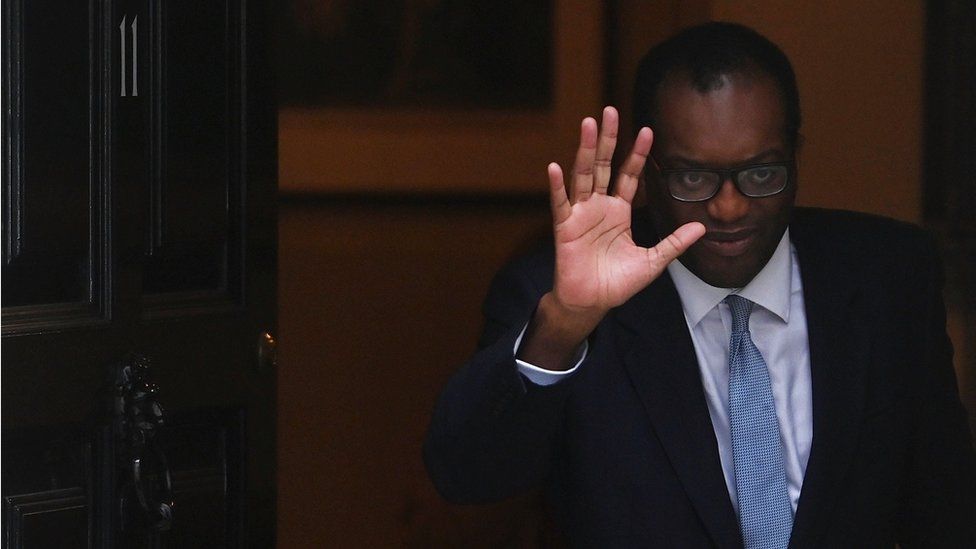ARTICLE AD BOX
 Image source, EPA
Image source, EPA
By Nick Eardley
BBC chief political correspondent
The downfall of Kwasi Kwarteng is one of the fastest in British political history. Just three weeks ago, in the poorly named mini-budget, he ripped up years of Conservative economic strategy.
The chancellor and prime minister were determined to take radical action in pursuit of economic growth. It didn't matter if parts were unpopular, they would do it anyway.
But key elements of the strategy proved too unpopular for the markets and for Tory MPs. The "Growth Plan" has now been scaled back, the chancellor has been removed from his job and the prime minister's own future remains in the balance.
Kwasi Kwarteng and Liz Truss were the closest of political allies. In 2012, they helped write Britannia Unchained, a right-leaning, free market prospectus for economic growth.
During the Conservative leadership campaign this summer, they worked together on an economic plan to be implemented if she won. They both agreed tweaks were not enough - that radical change was needed.
The relationship between 10 and 11 Downing Street is often rocky, but we were told this would be different and they would be "fully aligned".
Mr Kwarteng's allies briefed that their relationship was solid; that he saw his job simply as delivering the prime minister's vision for a low tax economy. One friend of the chancellor told me: She was the First Lord of the Treasury, his job was to serve her.
Those close to the chancellor also portrayed him as politically stubborn; once he had made up his mind he would stick with the plan. One said: "He doesn't tend to change ideology".
The message was clear: the chancellor believed in his strategy and was determined to see it through.
The Treasury was initially happy with the reaction to the mini-budget. But within days, things began to fall apart.
The markets reacted terribly, followed by many Conservative MPs. In off the record phone calls, they began to say they thought the government may have made a mistake - and to question the future of both the prime minister and the chancellor.
They were even angrier when Mr Kwarteng suggested he was planning more tax cuts - seeing it as a tone deaf response to political reality.
Soon came open revolt, with senior Conservatives openly criticising the decision to scrap the 45p additional tax rate. This forced Mr Kwarteng and Ms Truss into their first U-turn.
But it was not enough - and the mood among Conservative MPs remained mutinous. "Kwasi is a zealot," one told me. "The damage will last a decade".
A former minister added: "It's just incompetence."
Another said: "It feels like the last days of Rome… I don't think this is going to solve the problem".
Senior Tories hoped that things would start to calm down a bit after the conference. But the opposite was true as MPs returned to Westminster this week.
After Ms Truss faced a skewering from her own MPs in a private meeting of the 1922 committee, it was clear the 45p U-turn had done nothing to quell rebellion.
A well-connected backbencher described the mood in the party as "rock bottom".
So even when Mr Kwarteng insisted on Thursday that he was going nowhere, things had already started to change. It had become clear more U-turns were going to be needed. His allies say he took the decision to fly back to London from an IMF meeting in the Washington himself.
But he did not do it to resign voluntarily - sources close to Mr Kwarteng said this morning he was going to have meetings with the prime minister and others. In the meeting with Ms Truss, his cabinet career was brought to a swift end.
There is little sign Mr Kwarteng thinks he or the prime minister got the ideology wrong. He said in his resignation letter that the prime minister's vision was right, and that the country still needs to move on from high taxation.
Instead, he accepts the government needs to do more emphasise its commitment to balancing the books. The U-turn on corporation tax will make that a bit easier - reducing the size of the black hole that needs filled.
The prime minister will be hoping that by sacrificing her political bedfellow she saves her own job. Some have told me they are pleased with the appointment of Jeremy Hunt as chancellor.
But others criticised her performance at the press conference. Some still say she may have to ultimately carry the can for the economic strategy she dreamt up with Mr Kwarteng.
I asked one senior backer of Ms Truss for his take. "What can you think? This whole thing is a shambles now."
"How does she get rid of a chancellor that was doing her bidding? I just don't know."
But after just five weeks, the government's economic strategy lies in pieces. The bold promises of the early days are gone. It is hard to think of a political gamble which has backfired more - or a political relationship which has collapsed more quickly.

 2 years ago
32
2 years ago
32








 English (US) ·
English (US) ·